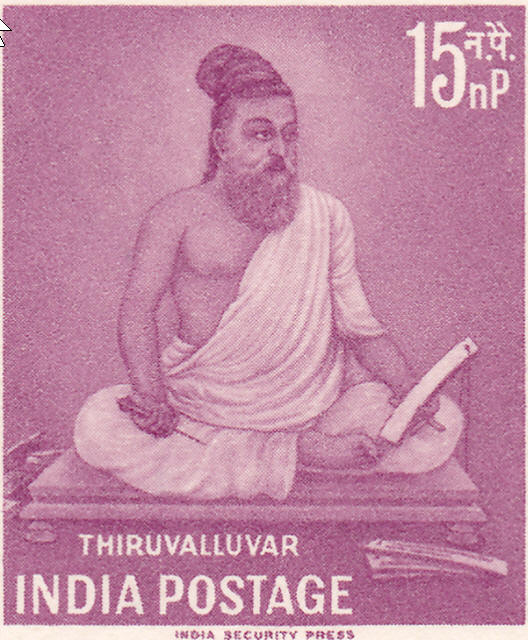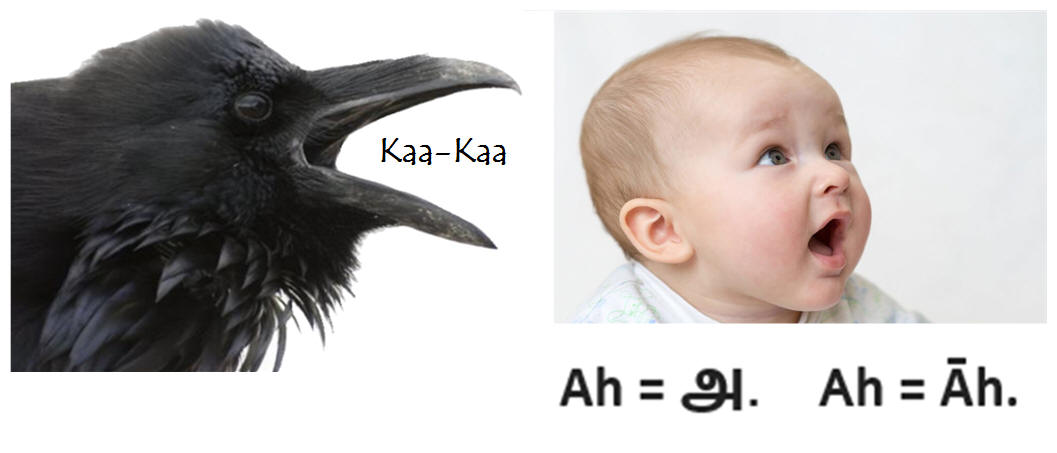திருக்குறள் = Sacred Verses = secular ethics
குறள் = distich = a rhyming couplet = a unit of two lines of verse
1. கடவுள் வாழ்த்து = The Praise of God
The Kural 01-10
Tiruvalluvar

The Tirukkural (Tamil: திருக்குறள், literally Sacred Verses), or shortly the Kural, is a classic Tamil text consisting of 1,330 couplets or Kurals, dealing with the everyday virtues of an individual. It is one of the two oldest works now extant in Tamil literature in their entirety, the other being the Tolkappiyam. Considered one of the greatest works ever written on ethics and morality, chiefly secular ethics, it is known for its universality and non-denominational nature. It was authored by Valluvar, also known in full
as Thiruvalluvar. The text has been dated variously from 300 BCE to 5th century CE. The traditional accounts describe it as the last work of the third Sangam, but linguistic
analysis suggests a later date of 450 to 500 CE.
குறள் 1
அகர முதல எழுத்தெல்லாம் ஆதி
பகவன் முதற்றே உலகு.
Akaram (அ = A) is the first letter among all letters. Likewise, God is the First in the world of his creations. When a baby emits its first sound Ah (அ = A), it indicates the first instinct, that is hunger and opens the mouth. The baby gets fed. The baby goes Āh (ஆ), indicating satisfaction and sometimes annoyance. The parents get so excited to see the baby’s satisfaction and go Eeee (இ & ஈ) and show their teeth. The next thing the baby does is U & Ū (உ & ஊ), a sound of pleasure. The grandparents walk in and go eh & Eh (எ & ஏ), showing their excitement. They haven’t heard the babble (மழலை) for some time. They say to the baby Ai or Hi (ஐ), the sound of greeting. The older sibling wanders into the room and says O and Ōh (ஒ & ஓ). The baby goes Au (ஔ), the sound of having wet its diaper.
• This is what I call as development of a alphabets and language like Tamil from Onomatopoeic sounds. Take the crow. It knows Tamil and tells its name is Kā -Kā (கா-கா = காக்கா = காக்கை = காகம் = காக்காய்.
This is how Tamil language developed. The babies and parents emit the vowels first in their babble, the consonants come later and the words further down the road.
What has this to do with God? In Hinduism, we call God Śabdabrahman (Sound Brahman = God of Sounds). In Christian tradition (the King James Bible), God said, “Let there be light and there was Light.” Let us see: What language did he speak? Most probably Sanskrit or Tamil. Yes, the Christian God, not different from Hindu God, was a Sound Brahman. As a matter of fact, God is one and goes by a multtude of religious and sectarian names. It is like a man being a father, who can be a son, a grandfather, an uncle, a husband, a worker…, carrying his different portfolios and name designations depending upon his relationship with others.

2. கற்றதனால் ஆய பயனென்கொல் வாலறிவன்
நற்றான் தொழாஅர் எனின்.
Of what gain is all that erudition if one does not worship at the good feet of the omniscient God?
மலர்மிசை ஏகினான் மாணடி சேர்ந்தார்
நிலமிசை நீடுவாழ் வார்.
When the devotee surrenders at the feet of Bhagavan residing in the flower of the mind, the reward is he will live long on this earth. Another meaning is the devotee will live forever in heaven, so he will not take rebirth on earth (liberation).
Kural 4.
வேண்டுதல் வேண்டாமை இலானடி சேர்ந்தார்க்கு
யாண்டும் இடும்பை இல.
Because we are human, dualities run our lives: Love and hate; like and dislike. God is free of these dualities. If you seek and attain refuge at his feet, you will never have
any afflictions under all circumstances.
Kural 5.
இருள்சேர் இருவினையும் சேரா இறைவன்
பொருள்சேர் புகழ்புரிந்தார் மாட்டு.
Ignorance is darkness, giving rise to two deeds (Merit and demerit புண்ணியம், பாபம்). These two deeds will not afflict those who praise the blissful God.
Kural 6.
பொறிவாயில் ஐந்தவித்தான் பொய்தீர் ஒழுக்க
நெறிநின்றார் நீடுவாழ் வார்.
We have five sense organs: body, mouth, eyes, nose, and ears. We should subdue these five organs. Such people whose conduct is above reproach and who follow the path of virtue will live long.
Kural 7.
தனக்குவமை இல்லாதான் தாள்சேர்ந்தார்க் கல்லால்
மனக்கவலை மாற்றல் அரிது.
God is unsurpassed. We should attain his holy feet. For others, it is rarely possible to alleviate the mental distress.
Kural 8.
அறவாழி அந்தணன் தாள்சேர்ந்தார்க் கல்லால்
பிறவாழி நீந்தல் அரிது.
The Ocean of Virtue is the foot of God. Barring those who attained the foot of God, no one else can swim the ocean of rebirth (and reach the shores of liberation)..
Kural 9.
கோளில் பொறியின் குணமிலவே எண்குணத்தான்
தாளை வணங்காத் தலை.
The head that does not bow to the God endowed with eight attributes is as useless as the sense organs lacking their respective functions.
The eight attributes of God are Bliss, Omniscience, Omnipotence, Benevolence, Freedom from Malas, Purity, Self-knowledge and Innocence.
குறள் 10:
பிறவிப் பெருங்கடல் நீந்துவர் நீந்தார்
இறைவன் அடிசேரா தார்.
Who can swim the immense ocean of birth (and rebirth)? Not the ones who do not reach the feet of the Inner Abider (= Iṛaivaṉ = இறைவன்).
T01-01-10TirukkuralPraiseOfGod